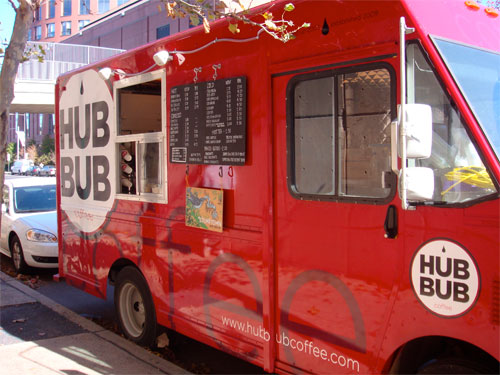PHILADELPHIA, PA – A rainy, windy forecast is a day to sleep in for many food truck owners. But the weather didn’t deter Jonah Fliegelman, Nathan Winkler-Rhoades, and Eric Hilkowitz, the owners of Pitruco, a two-month-old, Ferrari-red pizza truck, from serving lunch recently at 33d and Arch Streets, one of their regular spots. (Eric gets there at 8:30 a.m. to snag the space.)
Jonah called out to a customer, “Would you like an umbrella? We have some you can borrow.” He turned back to manning the truck’s centerpiece, a wood-fired oven where pizzas puff up to golden goodness.
On a day like this, they’ll be lucky if they serve 60 pies, says Winkler-Rhoades. In the world of food trucking, it’s just one of the many unknowns they battle daily.
Food carts and trucks have been a part of Philadelphia’s dining landscape for decades – traditionally serving egg sandwiches, Chinese food, and cheesesteaks.
But since 2009, following a national trend, about two dozen new-breed truckers have rolled onto the scene, entrepreneurs serving highbrow foodstuffs like espressos and duck tacos. In fact, efforts are under way to organize an association of this new wave of trucks, to collectively lobby for their interests. (See accompanying story.) In cities like L.A. and Portland, Ore., where the mobile truck scene is thriving, a strong infrastructure helps hopefuls navigate the system and obtain affordable goods.
“Food trucks are a burgeoning, vibrant fun part of Philadelphia’s scene. . . . We do everything we can to encourage innovative businesses like this to open and grow in our city,” says Deputy Mayor Alan Greenberger, a self-professed frequent food truck patron.
As with many aspects of the food industry, the romantic appeal often overshadows the rough reality. It is physically and financially challenging work. Some trucks – like Latin Farmer, Tyson Bees, and Coup de Taco – have closed after a short run, making it hard to tell if this is a viable industry or a short-lived trend.
For many fledgling truckers, a mobile eatery is a recession-friendly step toward restaurant ownership. But that doesn’t mean start-up and operating costs are low.
The Pitruco trio estimates they’ve invested around $25,000 to get started. The money came from financing and personal investments, and if sales stay steady, they will recoup start-up money by the end of the first year. Their truck is actually a trailer, hitched to a pickup that Fliegelman already owned, which kept costs down. Buying the oven, insulating it, and getting a generator were the biggest expenditures.
Andrew Crockett, who has owned HubBub coffee truck since 2009 – making him a grandfather of the movement – spent around $60,000 getting his vehicle ready. He has filtered water and an espresso machine. “If you don’t research you can get taken,” says Crockett. “One company was going to charge me $100,000.”
Most mobile vendors, as decreed by the health department, must rent a commissary to prepare the food. Ideally, the space can also provide a garage for the vehicle. Pitruco, HubBub, and a few others, pay about $450 a month for commissary/garage space in Grays Ferry.
Find the entire article from philly.com <here>




